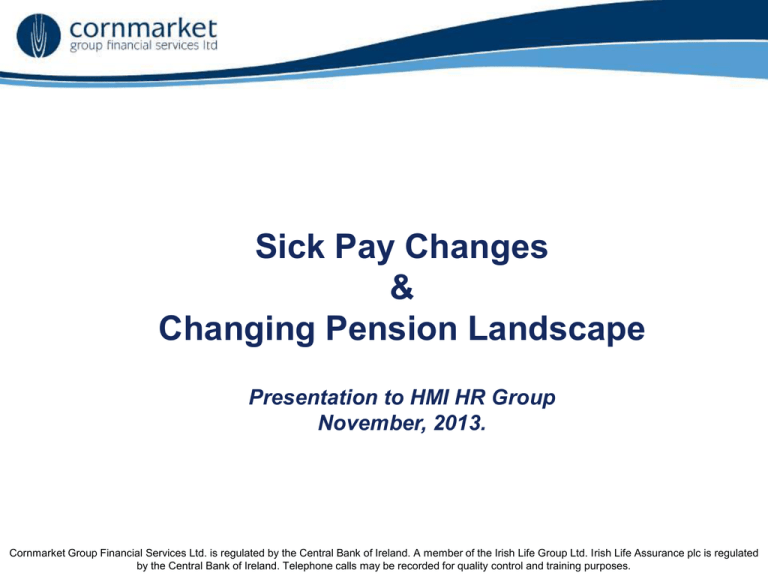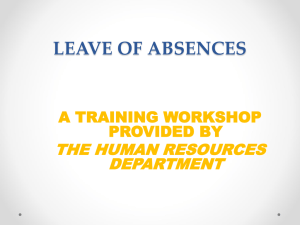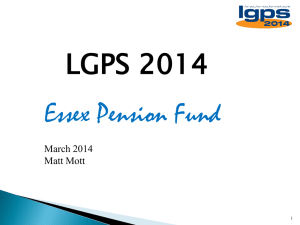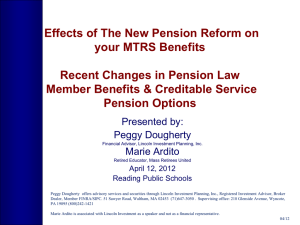HMI West Regional Meeting November 2013
advertisement

Sick Pay Changes & Changing Pension Landscape Presentation to HMI HR Group November, 2013. Cornmarket Group Financial Services Ltd. is regulated by the Central Bank of Ireland. A member of the Irish Life Group Ltd. Irish Life Assurance plc is regulated by the Central Bank of Ireland. Telephone calls may be recorded for quality control and training purposes. • Founded in 1972 (40th Anniversary in 2012) • One of Ireland’s largest brokers recognised as market leader in affinity schemes for Public Sector employees. • Acquisition of Marsh VGS’s in January 2013 • We now deal with over 14 Public Sector unions and administer over 50 Schemes covering over 53,000 public sector employees • Now a member of the GreatWest LifeCo group of companies. Key topics of today’s presentation Current proposals represent the biggest ever changes to sick pay for all Public Sector employees. Proposed changes to paid sick leave Paid Sick leave Self-certified sick leave reduced from 7 days in 1 year, to 7 days in a rolling 2 year period From 1st January 2014 - 3 months full pay & 3 months half pay (in a rolling four year period) Paid Sick leave for ‘Critical’* Illness - 6 months full pay, and 6 months half pay (in a rolling four year period) *Not yet defined Pension Rate of Pay re-branded ‘Temporary Rehabilitation Pay’ 100% 75% 50% Proposed Sick Pay Arrangements Full Pay €45,000 Half Pay 25% State Illness Benefit €22,500 €9,776 Temporary Rehabilitation Pay €3,931 Up to 13 weeks After 13 weeks After 26 weeks State Invalidity Pension €10,062 Early Retirement Pension €5,678 After 2 years The example above is based on a permanent, full-time Public Servant, who is a member of the Superannuation Scheme, with 15 years’ service earning €45,000 p.a., paying PRSI at the ‘A’ rate, who is now unable to work due to a long-term illness or disability. Claim is not for a critical illness. Member had no previous illness before joining the Scheme. Could you automatically go onto HALF PAY if you fall ill in 2014? 12 WEEKS 2010 2011 2 WEEKS 2012 No sick leave 2013 ? 2014 Example: In early 2011 Mary, a Public Sector employee, broke her leg and couldn’t work for 12 weeks. In 2012, she fell ill again and was out of work for a further 2 weeks. Since then Mary hasn’t been out sick. However, come January 2014, Mary needs to know that if she falls ill again and cannot work, her pay will automatically drop to HALF PAY; as she has already used up her 13 weeks full pay allowance. HALF PAY Critical Illness What constitutes a Critical Illness has not yet been defined but as per insurance industry the typical examples are: Cancer Stroke Heart related illnesses It will be provided for 6 months full pay, followed by 6 months half pay in a rolling four year period. (This Critical Illness entitlement is at the discretion of the employer) Temporary Rehabilitation pay Previously known as ‘Pension Rate of Pay’ Payable for UP to 18 months after the 6 months certified sick pay run out You must apply for Rehabilitation Pay before your sick pay runs out – will be subject to periodical reviews (probably every 3 months) Reviews will be carried out by an Occupational health consultant or by MedMark occupational healthcare. What happens after 18 months? 3 Options 1. Early Retirement Pension – Use of Early Retirement Pension table to calculate pension & gratuity 2. 3. Retiring on Ill Health means you cannot return to work in the Public Sector Option to go back to work You can opt to a maximum of 12 months of unpaid leave After 12 months you must either: I. II. III. Take Early Retirement Pension Go back to work or Resign from your current position 2 Options to Protect Your Salary 1 Union Salary Protection Group Schemes • INMO • SIPTU Schemes • Impact • PNA • IHCA 2 Private Salary Protection Plans • AVIVA • Friends First • New Ireland • Irish Life Cornmarket can advise on all options Salary Protection Schemes 100% 75% Full Pay €45,000 Scheme Benefit Scheme Benefit €20,043 €18,010 €11,250 Half Pay 25% State Illness Benefit €9,776 €22,500 Temporary Rehabilitation Pay €3,931 Up to 13 weeks Post January 2014 With Salary Protection you will receive up to 75% of your salary* Scheme Benefit 50% 1st After 13 weeks After 26 weeks State Invalidity Pension €10,062 Early Retirement Pension €5,678 After 2 years *Less any Temporary Rehabilitation Pay, Early Retirement Pension an/or State Illness Benefit to which you are entitled. The example above is based on a permanent, full-time Public Servant, who is a member of the Superannuation Scheme, with 15 years’ service earning €45,000 p.a., paying PRSI at the ‘A’ rate, who is now unable to work due to a long-term illness or disability. Claim is not for a critical illness. Member had no previous illness before joining the Scheme. What does it mean for you? Example: WITHOUT Salary Protection After 2 yrs Salary Service After 13 weeks After 26 weeks onwards… €45,000 15 years €22,500 €13,707 €15,740 Example: WITH Salary Protection Salary Service After 13 weeks After 26 weeks After 2 yrs onwards… €45,000 15 years €33,750 €33,750 €33,750 Example above is based on a Public Servant, who is a member of the Superannuation Scheme, with 15 years’ service earning €45,000 p.a., paying PRSI at the ‘A’ rate, who is now unable to work due to a long-term illness or disability. Standard sick leave is assumed. Member had no previous illness before joining the Scheme. The example above assumes that Temporary Rehabilitation Pay and State Illness Benefit is paid for up to a maximum of 2 years and, thereafter, the member is granted an Early Retirement Pension and State Invalidity Pension. Claims Handling The teams responsible for the smooth administration of Salary Protection schemes are: Phone Assistance One to one meetings in Office or Clients home nationwide Assistance with arranging medicals Help with Appeals process with the Insurance Company Help with FSO (Financial Services Ombudsman) if required. Tara Cassidy Assistant Manager in charge of Claims Source: The Economist – 07.04.11 Source: The Economist – 07.04.11 People living longer in retirement • 1950: 7.2 people aged 20-64 for every 1 person over 65 • 1990: 5:1 • 2012: 3.5:1 “Ireland’s numbers in retirement will double before 2040 to over 1m people with the biggest increase in the over 85s age group”* *Source – Department of Health • 2050: 1.8:1 In other words, every couple will be supporting a pensioner 1. People Live Longer In the USA, if a married couple both retire at 65, there’s a 50% chance one will live to 90+ longevity increased health costs additional pressure on health care services greater need for private health care nursing homes Source: The Economist – 07.04.11 3. Governments and companies cannot offer DB schemes If pensions are underfunded or government does not have enough money to pay pensions, they can reduce cost or burden by: – – – – – Raising taxes for existing workers Current generation of workers fund more to Pension Raise retirement age Halt practice of early retirement Auto-enrolment: compulsory for everyone to pay into a Pension – Link retirement age to longevity. How are Countries planning to deal with this? Proposed Retirement Dates Source: The Economist – 07.04.11 Spending in Retirement In retirement, people’s spending profile is U-Shaped Travel & spend healthcare Still active spend more spending more time at home spend less accumulate 60s 70s years 80s Pension Entitlements Currently different exist in the Public Sector: Pre 2004 (inc Supp PenPension for A ClassSchemes PRSI) Category 1. Pre 1995 Salary Pension Category 2.Age1995 Service to 2004 Category 3. 2004 to 2009 / 2010 to 2012 €20,625 30 yrs €55,000 Category 4.60 1st January 2013 - Single New Pension Scheme Post 2004 €55,000 60 30 yrs €8,686 •OAP now moving from age 65 -> 68 •Tax relief on pensions still available @ 41%* •Once-off option to withdraw up to (maximum) 30% of the value of your AVC Fund, subject to tax What are your options? …NSP, AVCs/PRSAs etc. *subject to paying the higher rate of tax Benefits payable from your Superannuation Scheme Pension Lump Sum Taxed & Paid for Life Tax-Free & Paid Once Spouse & Children’s Benefit Payable on Death What’s important when working out my pension? •Starting dates & re-entry dates •Service history •Final salary (except for 2013 Scheme) •Relevance of Social Welfare in your pension New Pension Scheme for 2013 • New Single Public Service Pension Scheme (Career average earnings) • Retirement in line with State pension age (SPA): 66 to 68 Minimum pension age of 66 to 67 in 2021 and to 68 in 2028 Pensions being linked to life expectancy (from 65 to 66 in 2014) • How will it work? • Referable amounts will accrue for each year service • Accrual rates of 0.58% on first €45k and 1.25% on balance • Lump-sum accrual rate of 3.75% • Annual increase in referable amounts in line with CPI. Enhancing your Pension Retirement planning is still a very tax efficient way to save Contribution €100 Less tax relief (assuming tax @41%) -41.00 NO PRSI rate (removed in Budget 2011) Real cost to you for every €100 €59.00 Options Available 1. Repurchase Superannuation credit for yrs spent in parttime/temporary service OR any Gratuity or Refunds 2. Buy Superannuation credit for missed years of service Notional Service Purchase Scheme (NSP) 3. Fund additional benefits for your retirement - Additional Voluntary Contribution Scheme (AVCs) or - Personal Retirement Savings Account (PRSA). How an AVC can be used Top up tax free lump sum to its max €00,000 Mixture of other options €00,000 Employer options ARF/AMRF €00,000 Pension (Annuity) €000 p.a. Last minute AVCs – (Dynamisation) Issues to be aware of for Retirement Planning 1. Public Sector Pensions Act 2012 (Career Averaging) 2. Public Service Superannuation Act 2004 3. Cost Neutral Early Retirement 4. Personal tax rates – now & in retirement 5. Social Welfare entitlements 6. Tax Relief Scope & limits 7. Fee, Charges, Commissions on Advice, AVCs & PRSAs 8. Partner Pension Details (if applicable). 5 Modules to choose from E-shot attachments for each module Booklet & Booking form Thank you for your attention Questions? Proud sponsors: Cornmarket Group Financial Services Ltd. is regulated by the Central Bank of Ireland. A member of the Irish Life Group Ltd. Telephone calls may be recorded for quality control purposes.






